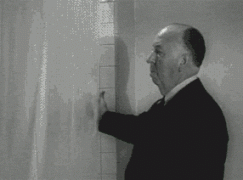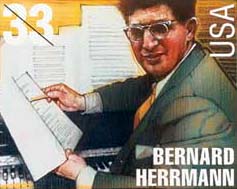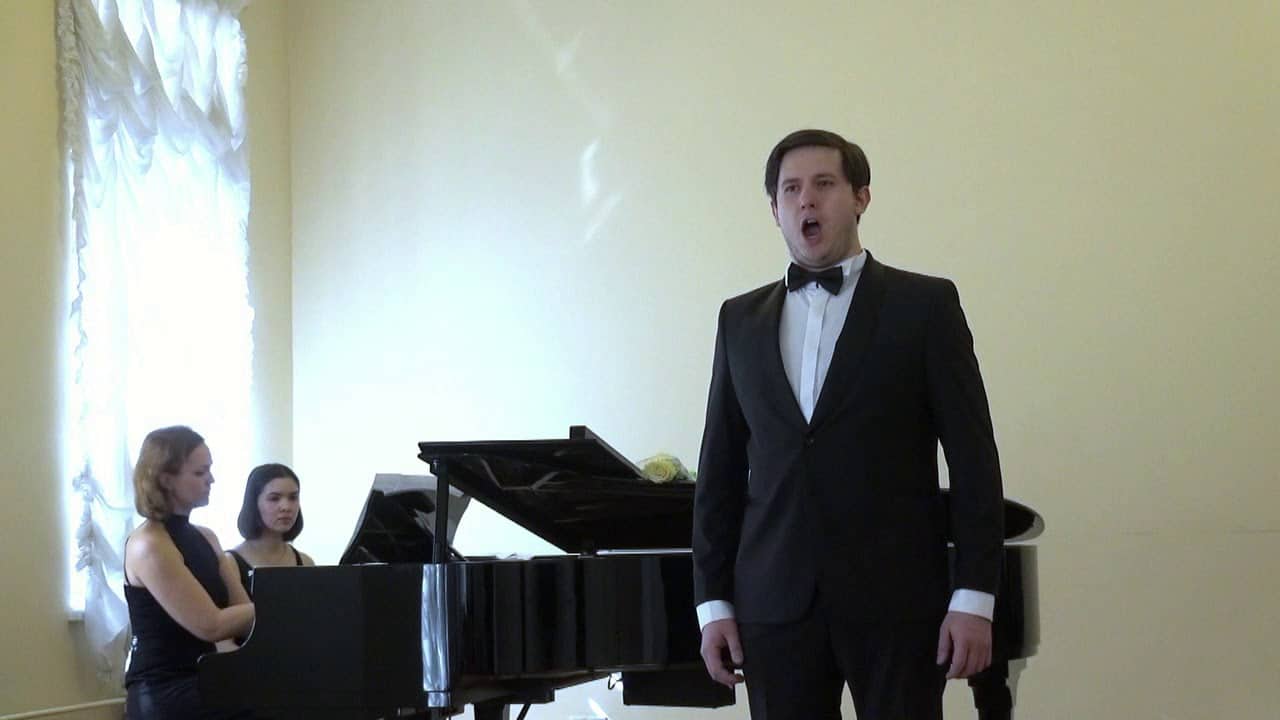Psycho gets a concert season
mainThe man who wrote the most chilling film score of all time – often emulated, never equalled – is to receive an intensive festival of his works this April in Washington, D.C. The season is the brainchild of our colleague Joseph Horowitz and it’s more than timely.
As Joe points out: Sir Simon Rattle began the current Berlin Philharmonic season with a program including the Berlin premiere of Bernard Herrmann’s Psycho: A Narrative for String Orchestra; the companion works were Arnold Schoenberg’s Die Gluckliche Hand and Carl Nielsen’s Symphony No. 4 (the “Inextinguishable”) – all music of high personal feeling.
The present Bernard Herrmann festival has been undertaken in the conviction that Rattle’s Psycho performance is a harbinger – that Herrmann is a major twentieth century musical personality whose time will come, and relatively soon.

press release:
A month-long celebration (April 1 to 26, 2016) presented by produced by PostClassical Ensemble, National Gallery of Art, Georgetown University, and AFI Silver Theatre and Cultural Center
A towering figure in twentieth century American music, Bernard Herrmann (1911-1975) has long been pigeon-holed as a “Hollywood composer.” Though he is widely acknowledged the supreme American composer for film (Citizen Kane, Vertigo, North by Northwest, etc.), his concert output remains virtually unknown. Working with the young Orson Welles and later with the legendary radio and screenwriter Norman Corwin, he was also America’s foremost radio composer, and conductor of a radio orchestra – William Paley’s visionary CBS Symphony – that boldly promoted new and unfamiliar music.
The present festival – a collaboration of PostClassical Ensemble, the National Gallery of Art, the AFI Silver Theatre and Cultural Center, and Georgetown University — is the first ever to celebrate Herrmann “in the round” as one of the most important and influential American musical personalities of his generation. It includes world-premiere recreations of two classic Corwin/Herrmann radio dramas with live actors and orchestra, the DC premiere of Herrmann’s “Psycho: A Narrative for String Orchestra,” a one-hour exploration of “The Music of Psycho” with live orchestra, screenings of 21 films, and much more. In addition to PostClassical Ensemble Music Director Angel Gil-Ordonez and Executive Director Joseph Horowitz (who principally curated the festival), the participants include the conductor/scholar John Mauceri, the Herrmann scholar Christopher Husted, the Corwin scholar Dan Gediman, the film-music scholar Neil Lerner, the composer’s daughter Dorothy Herrmann, and Norman Corwin’s daughter Diane Corwin Okarski.

Bernard Herrmann was born in New York in 1911 and died in Los Angeles in 1975. He joined CBS as a radio conductor, arranger, and composer in 1934 and there promoted a remarkable variety of important music; his studio guests included Bartok and Stravinsky. As an innovative composer for radio, he was the most important musical collaborator with Welles and Corwin. It was his radio work for Welles that led to his historic Citizen Kane score (1941). In Hollywood, Herrmann was especially linked with Alfred Hitchcock. Herrmann’s movie scores, 51 in all, are among the most honored ever created.





Not to be confused with Joseph Horovitz!
About time! Let’s hope the long neglected symphony gets around. The recording by the Phoenix Symphony needs to be supplanted. And wouldn’t it be great if music championed by Herrmann is also given another look; like Raff’s 5th? As to the most chilling movie score ever, Herrmann’s Psycho is handily outdone by Humphrey Searle’s score for The Haunting. Just my opinion.
I do agree, Cubs – Herrmann’s symphony is long overdue for a new recording. Several, in fact. I would be happy to perform and record the work, and I know that other conductors have an interest in it, among them William Stromberg and John Kendall Bailey. I would love to see Leonard Slatkin do this work, but he has his own personal misgivings about Herrmann which he made public. I have mentioned this work to many of my colleagues, and they either seem interested in doing it or not. I mentioned doing this work to the president of the Orchestra Society of Philadelphia in the near future, and will pursue the matter in obtaining the parts. I looked at the score when Alexander Broude handled it around 1976, and it was very impressive to study Herrmann’s handwriting and the work as a whole.
Adam Stern gave a wonderful response to your letter, and as he mentioned, he’s the only conductor who offered the last known performance, which is nearly a decade ago.
Let us hope more conductors read these posts and listen to the work and make up their own minds in performing it.
Herrmann’s music is brilliant. As a student and aspiring conductor, I discovered a score, and then a recording of his opera “Wuthering Heights”. Really hyper-romantic stuff, I fell head over heels for it and got permission at my university to secure rights to perform it (really dumb, I know, but I was a student). Novello was the publisher, I believe, and we corresponded back and forth for a time. Apparently the composer couldn’t be reached. Finally I got my rejection letter and was crestfallen.
Only later did I learn that Mr. Herrmann was one of the nastiest people in the business, and had we gotten rights, I was probably in for way more than I could handle!
But I’ve always been fascinated with him and a total fan. I’m glad to see my youthful instincts confirmed by Sir Simon Rattle, and before him, Esa-Pekka Salonen and others through performances and recordings. And yes, we need newer and better recordings of his best work.
I don’t know if he was one of the “nastiest people in the business” but he was apparently certainly very curmudgeonly and cantankerous. He made recordings in London with the National Philharmonic in the 70s – his own music and conducted some other composer’s works for the Phase 4 label. He was a big Stokowski fan and I believe the feeling was reciprocated by Stoki. His “Berceuse for the Fallen” is outstanding (check it on Youtube) and then there’s the aria he wrote for the wife of Citizen Kane to sing in the movie. It’s just amazing.
Hear Kiri Te Kanawa sing it here
https://www.youtube.com/watch?v=OzWX59Nvimw
Tremendously overwrought and absolutely fabulous. Charles Gerhardt (the best conductor never to conduct in public!) directs.
Steven Smith’s biography “A Heart at Fire’s Center”, provides really good insights into his gifts and personality. Generally speaking, orchestras hated him. And yes, he was still a genius.
This is a wonderful biography; I read it last year to bone up on a 2 hour lecture I was doing on the music of “Benny” Herrmann. He was a complex human being and rather misunderstood. His music is superb and unmistakable. Last week I was watching “Snow of Kilimanjaro” and the second the credits rolled I knew it was Herrmann’s music. And he was a great supporter of new music, being an advocate of Charles Ives long before that composer became widely known. Herrmann was a very well educated composer who had a great knowledge of music. I think I would have liked him very much.
Cantankerous, yes, and highly principled when it came to music and composition. The man knew his craft inside out (he was appalled at the notion of “composers” having their orchestrations done for them by other hands, as he believed the only one who knew what her/his music should sound like was its creator), and loathed modernism and experimentation for its own sake: “I hate all cults, fads and circles. I am not interested in music, or any work of art, that fails to stimulate appreciation of life and, more importantly, pride in life.”
To Cubs Fan: I had the pleasure of conducting Herrmann’s (sadly, only) Symphony in 2007. The performance materials were not in great shape — a fair amount of recopying of parts was necessary, as some of the revisions that were apparently made for Herrmann’s own recording with the National Philharmonic seemed to have been made on the fly, and were hastily scribbled at the tops or bottoms of pages, in the margins, etc. — but what a great experience. There was talk of a new edition being contemplated at the time; I hope it has come about it is at least imminent. The work sounds even better in person than on recordings; the orchestration is flawless.
Oh, and one final note regarding “cantankerous”: I once met Herrmann’s daughter Dorothy (nicknamed “Taffy”) who told me that, contrary to his reputation amongst his colleagues, Herrmann was a consistently kind, loving and patient father. He just seems to have had a defensive — and, on the face of it, fairly realistic — view of the professional world: “I always find difficult people easy. I only find glad-Harrys difficult and vacuous. Nice guys are difficult. It’s because they’re a bunch of empty-heads, that’s why they’re nice guys! They pretend to be nice guys, but it’s a disguise. They’re not nice. They’re vicious, vindictive people who try to make sure that anything good hasn’t got a chance!” (Surely he wasn’t speaking of his experiences in Hollywood?)
Adam, I have wanted to conduct Herrmann’s symphony for the longest time, and it’s interesting that you mentioned about the condition of the parts, as I have broached about doing a reading of the work with the Orchestra Society of Philadelphia in the near future, but I know that the parts would have to be in extremely readable condition in order to not into things that can stop a rehearsal for nearly twenty minutes! But if it still obtainable, I would do it in a heartbeat.
But in terms of Herrmann the man, he was one who simply had an intuitive eye for people that he felt did not suit his perception of the world. He had a distaste for certain conductors that he felt were not up to his standards. I interviewed Eric Bravington, general manager for the London Philharmonic back in the 1970s, and he told me that when the LPO decided to invite Herrmann to do a series of concerts at Royal Festival Hall, Herrmann wanted to know who the other conductors were on the series. Bravington named several, among them Haitink, Solti, Giulini and Boult. “Boult is great…the rest are rubbish” was Herrmann’s response. Unfortunately, he never got the chance to do that series, not to mention that Herrmann was also sensitive about the hall – he wanted to do the concerts at Royal Albert Hall, which he felt had better acoustics.
Herrmann, for my money, is still one of America’s greatest composers, whether for the cinema or the concert hall, not to mention one of the finest champions of Ives, Vaughan Williams, Elgar, Rubbra, Raff and many other composers that were worthy of his baton and keen insight.
Erratum…
Not get into things. My bad!
Ironic that he thought so little of Haitink, who became one of the great Vaughan Williams conductors of his era.
Erratum:
I hope it has come about or is at least imminent.
This is so wrongheaded. Herrmann _was_ a brilliant film composer, but that’s not the same as a composer for the concert hall. Without the film scores, and if we’re the least bit familiar with the influences he draws from, we’d hear how derivative his music really is. Even the score of Psycho is rather uninteresting without the film, particularly if one knows whose music he’s drawing from.
Absolutely wrong. Completely. His music for “Fahrenheit 451”, from which a suite was made, is totally wonderful music and highly original. The suite from “Taxi Driver”…. superb.
I can’t agree with your statement one bit, Rainer. Herrmann was not a “film composer” as you put it. Herbert Stothart was a film composer. Hans Zimmer is a film composer (although some would really wonder and place quotes on the term!), but Herrmann was, like Vaughan Williams, Walton, Copland and Prokofiev, a composer who just happened to write for films. If he had been as prolific as Victor Young or Max Steiner and devoted himself solely to the cinema and not compose any concert works, that would be a different story.
The concert works are from the same man. One of the reasons why his concert music sounds “derivative” to those used to his film scores is because he couldn’t use the established orchestra as a lab the way he could with his scores for radio, television and the movies. He couldn’t bring his brand of minimalism to the symphony, as he was deep down a traditionalist who adhered to the principles of concert music at that time. Sure, he probably could have out-Ives Ives and composed a symphony equal to his fourth, and in some ways he did when he composed the scherzo of his own symphony – an Ivesian take on Beethoven’s Ninth, but pure Herrmann all the way.
The symphony is pure Herrmann, even if one hears echoes of Ives, Sibelius and Walton. The first movement takes up in many ways where his score for “Citizen Kane” left off. His cantata on “Moby Dick” is a homage to many of the composers he admired and stands tall alongside the more virile choral/orchestral works of Delius and Elgar, as well as Elgar’s “Sea Pictures” and Frank Bridge’s “The Sea”, not to mention the impressionistic evocations of the sea from Debussy and Ravel.
If derivation is a form of weakness from a composer, it is also their strength because they can build from those traditions and make them their own. Herrmann’s vision as a composer was unlimited in many ways, and when he wanted to be experimental, it had to be for the right venue, just as it had to be the right place when he needed to be traditional.
Herrmann is a true original who knew his forebears, paid homage to them in his own way, and built a new sound with those components at his disposal.
You said it for me, too, Mr. Scott. Thanks.
For those who see this in time, Australian Broadcasting will stream on the web a concert of Herrmann film music performed by the Melbourne Symphony Orchestra on 6 Feb. Start time is 1PM Saturday Feb 13 in Sydney (= 2300h Friday Feb12 NYC EDT).
Schedule and program:
http://www.abc.net.au/classic/music-listings/?date=2016-02-13
Correction, 1300 Sydney Saturday afternoon is 2100h NYC EDT Friday night.
I also hope that Herrmann’s chamber music will be played. I only know one piece: his splendid Clarinet Quintet, which is performed from time to time. Herrmann’s harmonic approach was unique, as was Fauré’s and other composers’ who deserve more recognition and exposure.
Also worth noting is that Hermann produced one of the great recordings of all time – Barbirolli conducting the Sinfonia of London (a session orchestra that recorded many film scores in the ’50s and ’60s) in Vaughan Williams’ Tallis Fantasia.
Herrmann very wisely suggested the Temple Church as venue for that recording, and he was present, surely to its benefit. But Victor Olof was the Producer.
Rainer gee I get it troll Rain on your parade. Clever. In any case. Psycho is a masterpiece. The only music Herrmann borrowed from for the score was his own music! The Sinfonia for Strings. Herrmann was his own man and his music is not like anyone. An individual voice and unique.As of the choice of music to play at the concert this is way to conservative a choice. I would rather hear Mysterious Island or Beneath the 12 Mile Reef or Journey to the Center of the Earth
Frankly, with all my admiration for Herrmann, some passages of “Psycho” must have been inspired by Honegger’s 2nd Symphony…